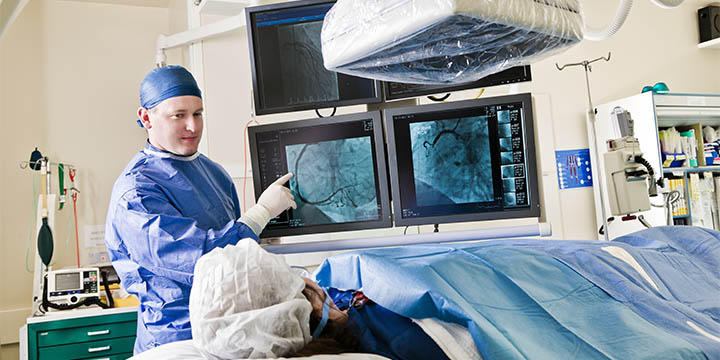At Stern Cardiovascular, several of our doctors are interventional cardiologists. With advanced degrees specialized training, and new technologies, they are prepared to use non-surgical diagnostic and treatment methods that are considered minimally invasive. Advantages of using interventional procedures include avoiding scarring, pain and decreasing long post-operative recovery.
Interventional cardiologists access the arteries in your body and in your heart using a minimally invasive technique, either through an artery in your wrist or in your groin. They are skilled at diagnosing abnormalities in your arteries as well as treating blocked arteries that are causing problems. With an interventional procedure, there is a good chance you will go home the same day as your procedure.
Cardiac Catheterization
This test involves insertion of a catheter (a small tube) in an extremity, either your wrist or groin, with subsequent advancement through the arteries or into the cardiac structures to either record pressures, inject dye and take moving x-ray pictures, or open up blocked vessels.
Percutaneous Coronary Intervention (PCI) / Percutaneous Transluminal Coronary Angioplasty (PTCA) / Stent Placement
This is a non-surgical procedure in which a balloon is inflated in the artery to open up the blood flow within a blocked artery. Doctors use stent placement for coronary arteries that are blocked. A stent is a small tube made of stainless steel, encoded with special medication that is inserted into narrowed arteries to act as a scaffold and create an opening for the blocked artery.
Right Heart Catheterization
Right heart catheterization is a technique in which a catheter with the pressure monitor is inserted through your groin vein or through the vein in your neck in order to measure the pressures in the right side of your heart, your pulmonary arteries. This technique also assesses the amount of blood that is pumped out of your heart with every beat as well as oxygen levels in the different chambers of your heart. This technique is used to assess the severity of various heart conditions including pulmonary hypertension, valvular heart disease, left and right sided heart failure.
